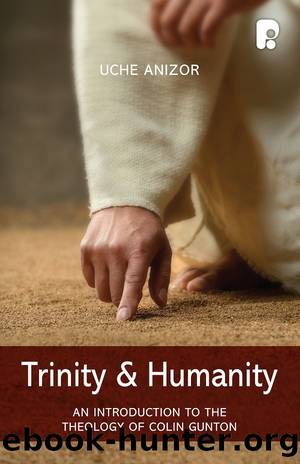Trinity and Humanity by Anizor Uche;

Author:Anizor, Uche;
Language: eng
Format: epub
Publisher: Authentic Media
Published: 2016-08-15T00:00:00+00:00
Sacrifice
The last metaphor, Gunton observes, connects least naturally to modern readers, not least because of the seemingly primitive and savage character of blood sacrifice.34 Guntonâs task is to rehabilitate the metaphor of sacrifice so that it performs the function of other metaphors: to give expression to the way things are in the world. He asks how sacrifice might uniquely convey the work of God through Christ. At a basic level, sacrifice performs a function similar to victory and satisfaction, that is, âthe ordering and reordering of human life both in relation to God and in the cosmosâ.35 What is the disorder for which the sacrifice of Christ is the remedy? In the case of victory, sin conceived as bondage was that from which Christ set humanity and the cosmos free. The metaphor of justice views the problem as lawbreaking and moral disorder, which are set right by the satisfaction of the God-man. With respect to our present metaphor, the problem is pollution, which only a sacrifice can remove.36 Although sacrifice may seem irrelevant to moderns prima facie, Gunton contends that it is a universal feature of human experience, as much as is our instinctive abhorrence of dirt, sickness and death. The language of sacrifice is regularly deployed â in ancients and moderns alike â to speak of that which restores cleanness.37 What do we make of the metaphor when applied to Christâs life and death?
In the Old Testament, sacrifices were carried out for a variety of purposes and the idea was interpreted both literally and metaphorically. What all sacrifices held in common, however, was their context: Godâs deliverance of Israel.38 Whatever a sacrifice was, it could not be understood divorced from the backdrop of Yahwehâs saving of a people for himself. In the New Testament, metaphorical uses of sacrifice abound. Praise and good works are sacrifices (Heb. 13:15â16), as are living bodies (Rom. 12:1), for example. When applied to Jesus, âsacrificeâ is certainly used metaphorically, since there is, for example, no priest offering him or altar, but soldiers and a cross. This does not mean that Christâs death is not a sacrifice; but we must understand what is meant exactly by the employment of this particular metaphor to describe his work. In fact, Gunton writes, âwe understand from the life and death of Jesus what a sacrifice really isâ.39 The fluidity of Scriptureâs use of sacrificial language signals that literalism will not get us very far in understanding the atonement as a sacrifice. As a metaphor birthed from the dialogue between language and the ultimate reality of Godâs saving work in Christ, sacrifice sheds new light on God and human life in his world. First, because sacrifice is finally understood with reference to Christâs death, all animal sacrifices are rendered obsolete. The metaphorical sacrifice of Jesus replaces the literal sacrifices of the old order, which could never do what Christâs did. Second, in Christ there is a conjoining of offerer and offering, priest and sacrifice. A central feature of Jesusâ
Download
This site does not store any files on its server. We only index and link to content provided by other sites. Please contact the content providers to delete copyright contents if any and email us, we'll remove relevant links or contents immediately.
Fangirl by Rainbow Rowell(8808)
How to Bang a Billionaire by Alexis Hall(7942)
Wonder by R. J. Palacio(7750)
The Space Between by Michelle L. Teichman(6589)
The Thirst by Nesbo Jo(6458)
Assassin’s Fate by Robin Hobb(5867)
Wiseguy by Nicholas Pileggi(5336)
The Night Circus by Erin Morgenstern(5044)
The Kite Runner by Khaled Hosseini(4963)
Paper Towns by Green John(4815)
Bittersweet (True North #1) by Sarina Bowen(4720)
Gerald's Game by Stephen King(4386)
Too Much and Not the Mood by Durga Chew-Bose(4105)
Pillow Thoughts by Courtney Peppernell(4039)
Goodbye Paradise(3464)
Twelve Days of Christmas by Debbie Macomber(3421)
Good by S. Walden(3361)
The Rosie Effect by Graeme Simsion(3223)
The Cellar by Natasha Preston(3081)
